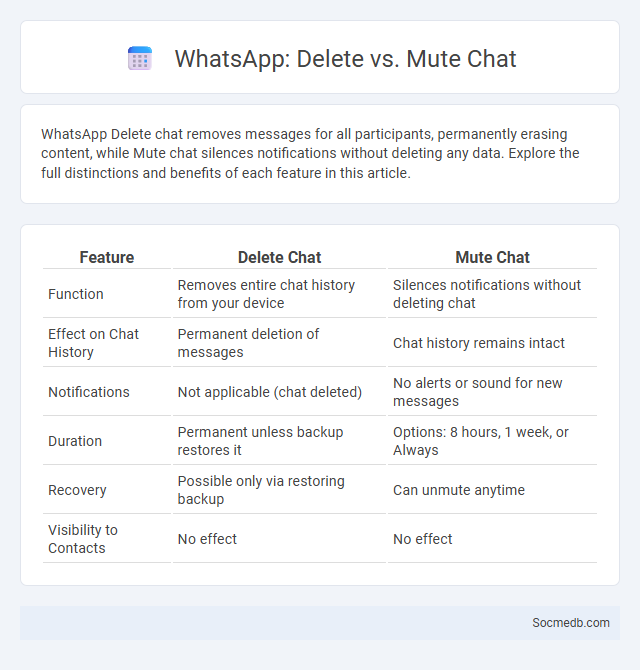
Photo illustration: WhatsApp Delete vs Mute chat
WhatsApp Delete chat removes messages for all participants, permanently erasing content, while Mute chat silences notifications without deleting any data. Explore the full distinctions and benefits of each feature in this article.
Table of Comparison
| Feature | Delete Chat | Mute Chat |
|---|---|---|
| Function | Removes entire chat history from your device | Silences notifications without deleting chat |
| Effect on Chat History | Permanent deletion of messages | Chat history remains intact |
| Notifications | Not applicable (chat deleted) | No alerts or sound for new messages |
| Duration | Permanent unless backup restores it | Options: 8 hours, 1 week, or Always |
| Recovery | Possible only via restoring backup | Can unmute anytime |
| Visibility to Contacts | No effect | No effect |
Understanding WhatsApp Chat Management Options
WhatsApp offers various chat management options designed to streamline your messaging experience, including archiving, muting, and pinning conversations for better organization. Users can also utilize chat backups and export features to securely store and transfer important messages. Understanding these tools enhances your ability to manage chats efficiently and maintain privacy in busy communication channels.
What Does ‘Delete Chat’ Mean on WhatsApp?
'Delete Chat' on WhatsApp means permanently removing an entire conversation thread from your chat list, including all messages, images, videos, and voice notes exchanged within that chat. This action only deletes the conversation from your own device and does not affect the chat history on the recipient's or group members' devices. Using 'Delete Chat' helps manage storage space and maintain privacy by clearing out unwanted or obsolete conversations.
The Functionality Behind ‘Mute Chat’
The 'Mute Chat' feature on social media platforms allows users to silence notifications from specific conversations without leaving the group or unfollowing the person. This functionality improves user experience by reducing notification overload while maintaining access to the chat history and updates. By managing notification preferences, users retain control over their engagement and minimize distractions in crowded digital environments.
Exploring the ‘Revoke Message’ (Delete for Everyone) Feature
The 'Revoke Message' or 'Delete for Everyone' feature on social media platforms allows you to remove sent messages from both your chat and the recipient's view, enhancing control over your digital communication. This functionality is crucial for correcting mistakes, preventing misunderstandings, and protecting sensitive information within seconds after sending. Understanding the time limits and platform-specific rules for message revocation ensures you maximize your privacy and maintain your social media reputation effectively.
Key Differences: Delete vs Mute vs Revoke on WhatsApp
Deleting a message on WhatsApp removes it from your chat but may still be visible to recipients if not deleted for everyone, while muting a contact silences notifications without affecting message visibility. Revoking in WhatsApp involves the "Delete for Everyone" feature, which attempts to erase the message from all devices within a time limit, offering more control over sent content. Understanding these differences helps you manage your privacy and notification preferences effectively on your WhatsApp account.
When Should You Delete a WhatsApp Chat?
You should delete a WhatsApp chat when it contains sensitive information that you no longer need or want to keep for privacy reasons. Regularly clearing chats can help free up storage space on your device and improve its performance. If a conversation is cluttered or irrelevant, deleting it can streamline your app experience and enhance your digital organization.
Situations Best Suited for Muting Chats
Muting chats on social media is ideal when you want to maintain focus during important tasks or avoid distractions during meetings and personal time. It's also effective when you're part of large group conversations that generate excessive notifications without requiring immediate responses. By muting chats, your social media experience becomes less intrusive, allowing you to engage selectively and protect your mental well-being.
Using ‘Revoke Message’ to Rectify Mistakes
Using the 'Revoke Message' feature on social media platforms allows you to quickly delete or withdraw sent messages, minimizing the impact of mistakes such as typos, misinformation, or unintended recipients. This tool enhances digital communication control, ensuring your interactions remain clear and professional while safeguarding your online reputation. You can avoid misunderstandings and maintain a polished social media presence by promptly correcting errors through message revocation.
Privacy Implications of Each WhatsApp Action
Every WhatsApp action carries specific privacy implications, such as message encryption safeguarding your conversations, while features like status updates expose your activity to contacts. Sharing location or media files can inadvertently reveal sensitive personal information to unintended recipients. It's crucial to manage your privacy settings actively to protect your data from potential misuse or unauthorized access.
Tips for Managing Conversations Effectively on WhatsApp
Managing conversations effectively on WhatsApp involves setting clear group rules and using features like mute, pin chats, and message reactions to stay organized and reduce notification overload. Utilize broadcast lists for announcements to avoid cluttering group chats and employ the search function to quickly locate specific messages, ensuring timely responses. Regularly archive inactive chats to keep the interface clean and leverage WhatsApp's end-to-end encryption to maintain privacy and security in all conversations.
 socmedb.com
socmedb.com